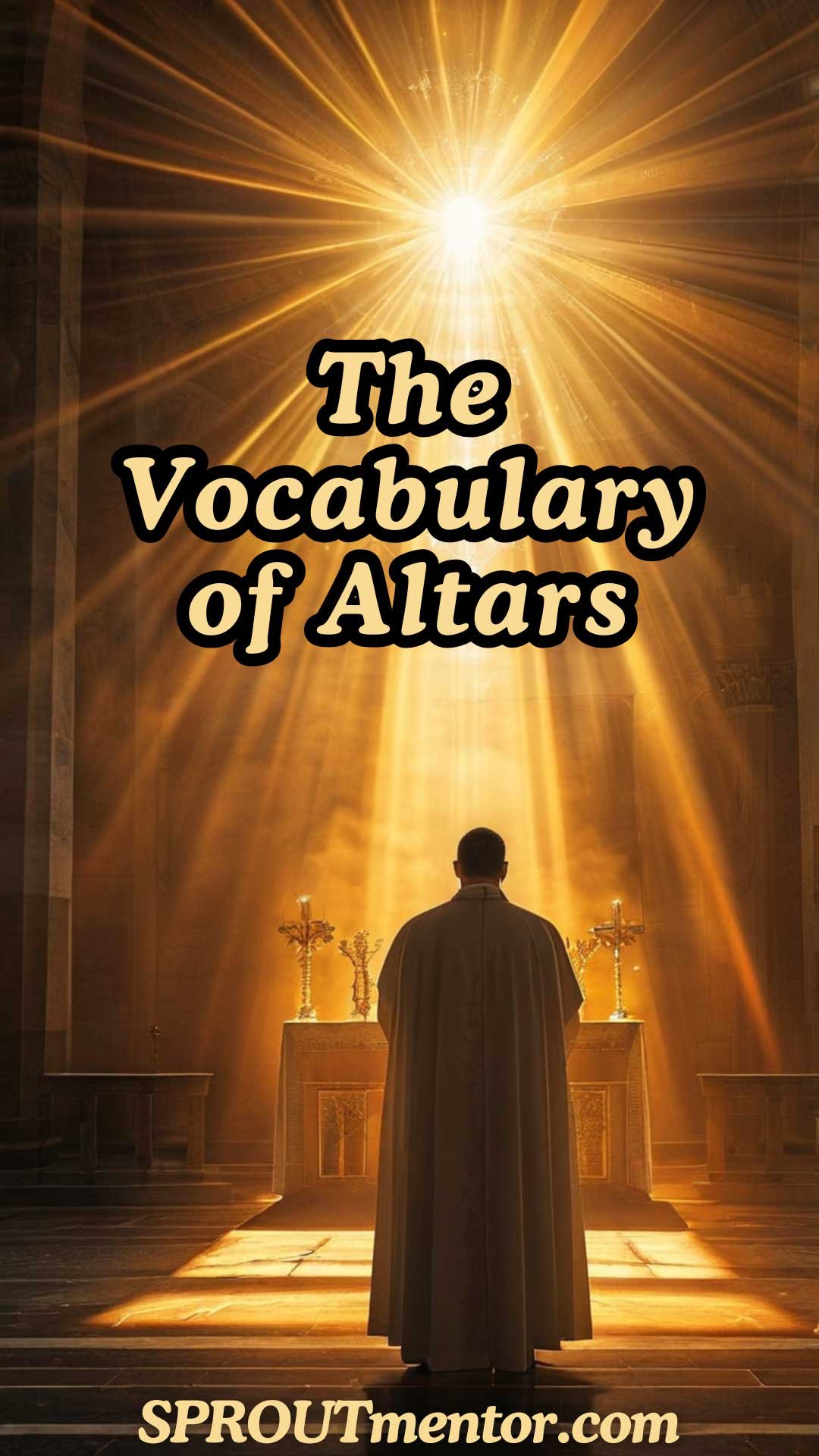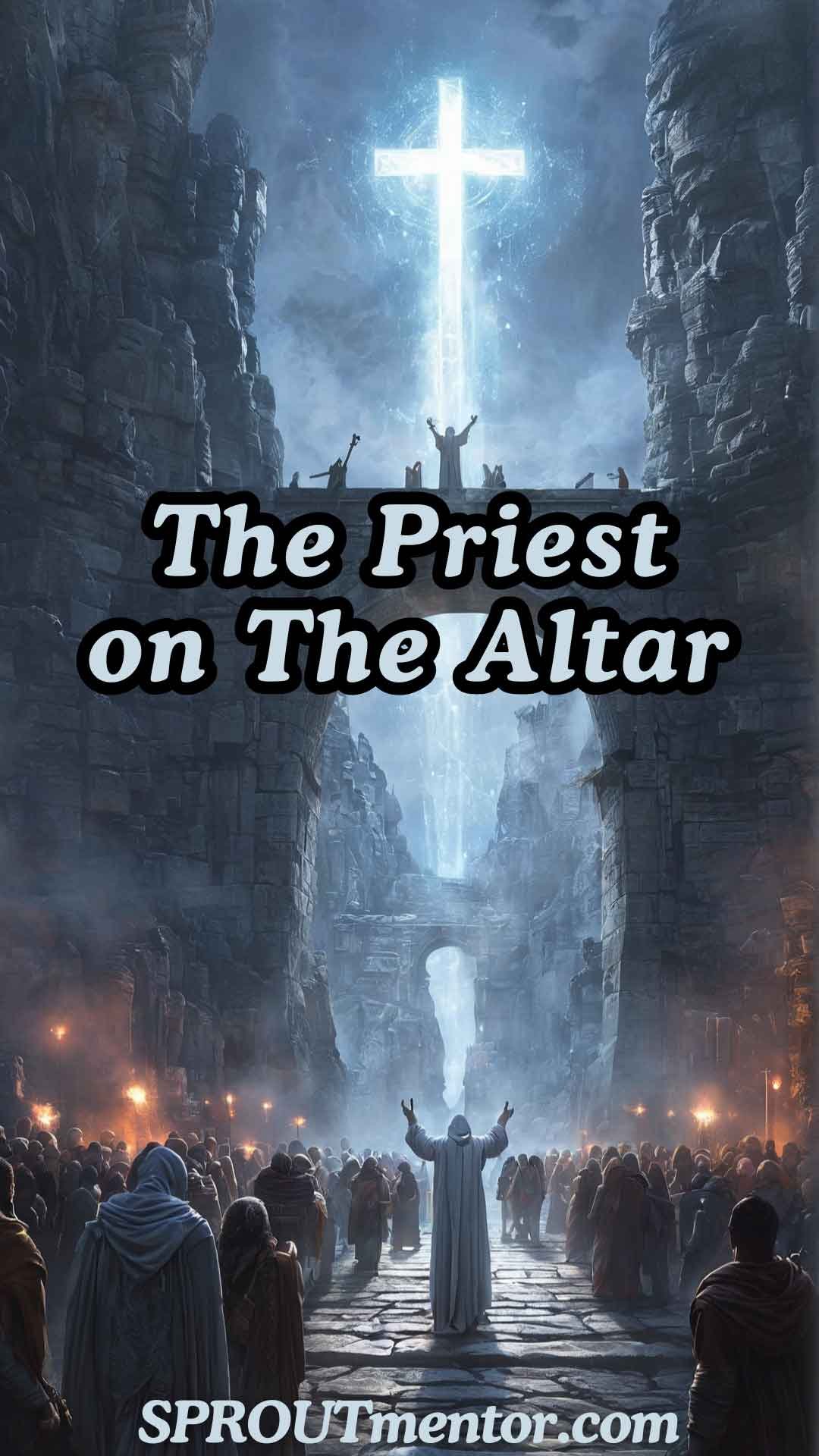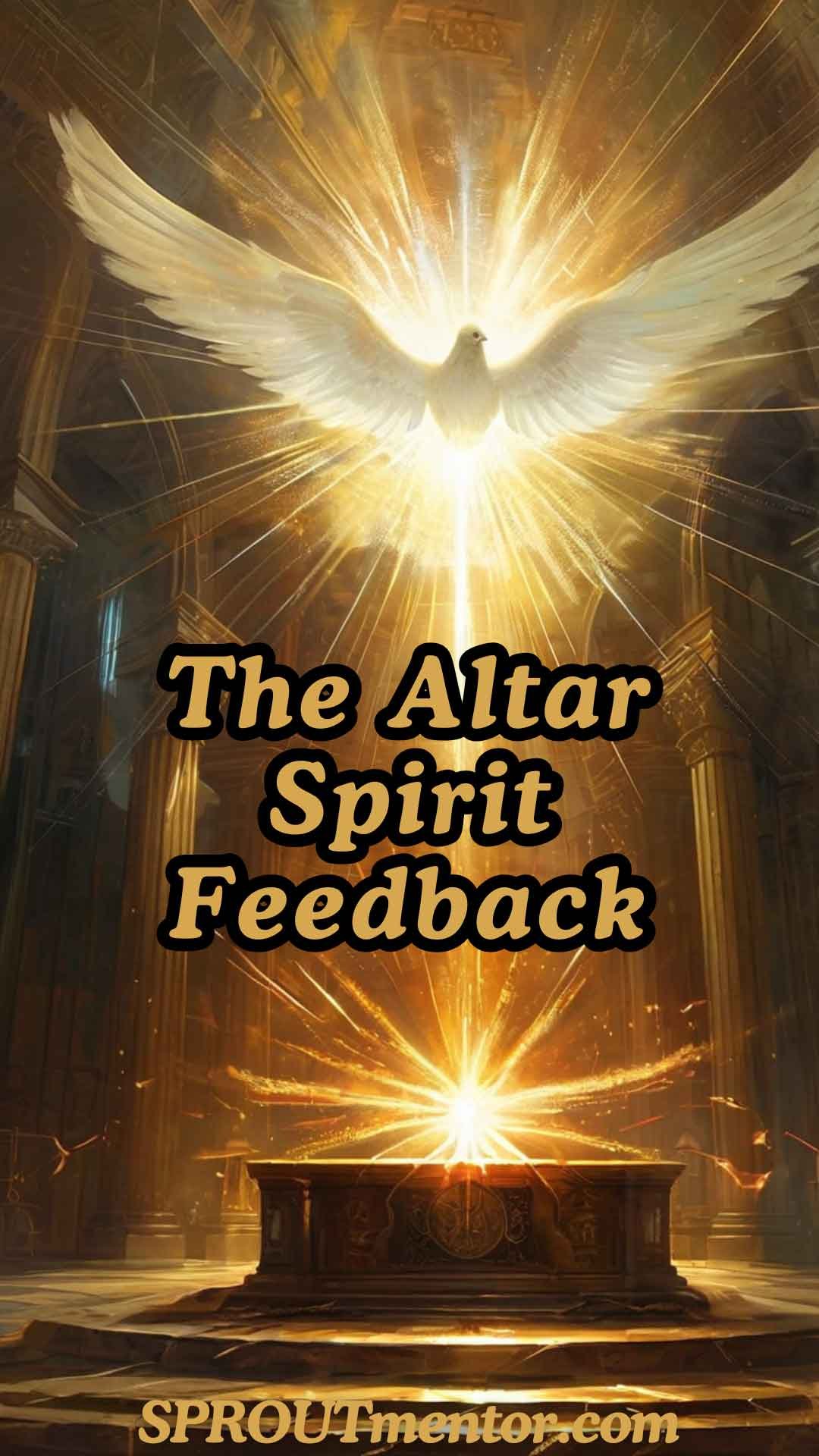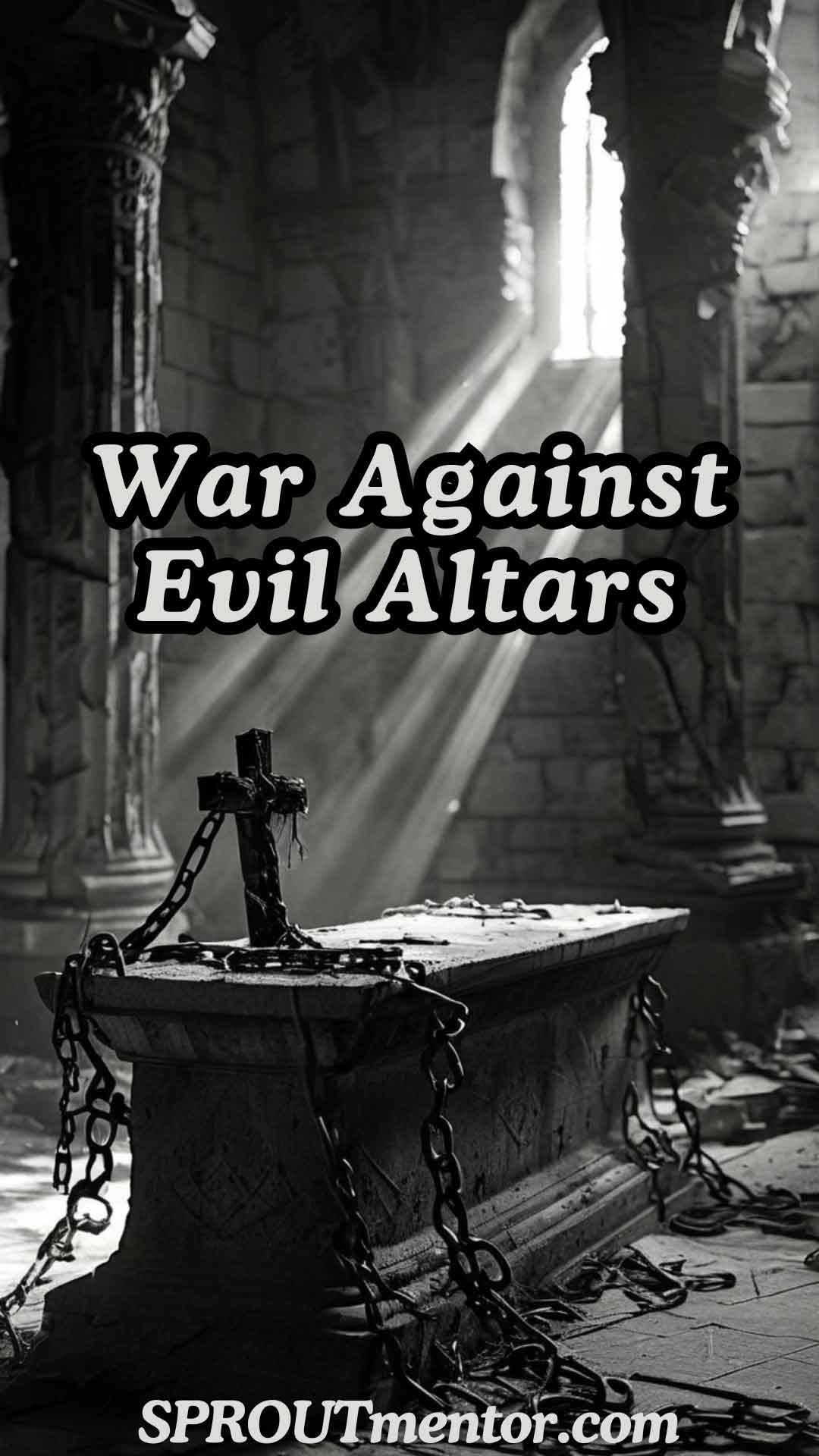The Vocabulary of Altars

As we continue with the third lesson in our series on The Science of Altars, today we delve into the terminologies or vocabularies surrounding the concept of altars.
Understanding these terms will lay the groundwork for deeper exploration in future teachings:
#1 – Priesthood
In the previous lessons, we established that the altar serves as a spiritual bridge between two realms: the physical, tangible Earth and the invisible, spiritual heavens.
- Priesthood refers to the office and function of priests, who act as the human intermediaries between the divine and the earthly realms.
- In other words, a priest is the human attendant who stands at this bridge, mediating between these two dimensions.
- Priests are responsible for offering sacrifices, leading worship, and maintaining the sanctity of the altar.
In the Old Testament, priests were chosen from the tribe of Levi:
- Their role was to maintain the altars, offer sacrifices, and intercede for the people [Leviticus 16:15-17].
- They were consecrated individuals, set apart for the holy task of mediating between God and man.
- This underscores the importance of purity and holiness in the priest’s role.
- A priest could not approach the altar without first being purified and sanctified, as any defilement could render the sacrifice unacceptable.
In the New Testament, the concept of priesthood evolves.
- All believers are considered a “royal priesthood” [1 Peter 2:9], meaning that we all have the responsibility and privilege of offering spiritual sacrifices to God.
- For instance, our bodies are the living sacrifices [Romans 12:1], and our prayers and praises are the incense that rises before God [Revelation 5:8].
Therefore, the concept of the priesthood is central to understanding altars because the priest is the one who ministers at the altar, and they should be:
- Consecrated: The priest must be set apart because God Himself is holy [Leviticus 11:44-45]. The consecration of the priest ensures that the altar remains a sacred space, free from defilement.
- Covenanted: The priest’s role is not a temporary or casual one; it is bound by a covenant. This covenant demands for the priest’s commitment, dedication, and consistency in maintaining the altar.

#2 – Sacrifice
The very word “altar” is derived from a Hebrew term meaning “place of slaughter or sacrifice.”
- An altar without a sacrifice is like a lamp without oil—powerless and ineffective.
- Sacrifice is the fuel that powers the altar.
- Without it, the altar remains dormant, devoid of the spiritual activity it is meant to generate.
- In other words, without sacrifice, an altar is just a monument or structure because it is the act of offering that gives the altar it’s power.
- This underscores the fact that altars are not just places of worship but also places of significant spiritual transaction.
In the Old Testament, sacrifices were made on physical altars as acts of worship, atonement, and thanksgiving.
- These sacrifices were usually animals, which were offered to God as a way of seeking forgiveness or expressing gratitude [Leviticus 1:3-9].
- The shedding of blood was a crucial element, symbolizing the seriousness of sin and the need for atonement.
In the New Testament, the concept of sacrifice evolves from the physical to the spiritual.
- The ultimate sacrifice of Jesus Christ on the cross was the final physical sacrifice for the New Covenant believer.
- His death was the perfect and final sacrifice, fulfilling the requirements of the Law and opening the way for all humanity to be reconciled with God [Hebrews 10:10].
- Therefore, sacrifices in the New Testament are not just about giving up material things but about offering our entire lives to God [Romans 12:1].
- It involves the daily act of dying to self, putting God’s will above our own, and living a life that is pleasing to Him.
- This shift signifies a deeper, more personal form of worship where we die to Self and allow God to govern our lives fully.

#3 – Supervising Spirit
In the spiritual realm, there is a concept known as the “mirroring principle,” [Genesis 1:26]:
- This principle is based on the idea that certain actions, rituals, or behaviors carried out by human beings can create an atmosphere or climate that mirrors the conditions in the spiritual realm, thereby attracting the presence of a spiritual being.
- When a priest begins to engage in specific spiritual activities—whether it be offering sacrifices, burning incense, or performing rituals—they are essentially mirroring what happens in the spiritual realm.
- By doing so, they create an environment that is conducive to the presence of a spirit, allowing it to move freely and interact with the physical world without even realizing that it has crossed into a different realm/dimension.
- The spirit, feeling at home in the mirrored environment, moves freely and begins to communicate or manifest its presence.
- In essence, the mirroring principle is about creating a spiritual atmosphere that reflects the conditions necessary for the supervising spirit to dwell and operate.
- If the actions of the priest mirror the activities in the spiritual realm correctly, they create a welcoming environment for the supervising spirit.
The supervising spirit is crucial because it is the one who receives the sacrifice and responds to it.
- The strength and effectiveness of an altar are directly related to the supervising spirit’s presence.
- For example, in the Old Testament, God’s presence was often manifested at the altar in the form of fire, cloud, or smoke [Exodus 40:34-38].
- This visible manifestation was a sign that God was pleased with the sacrifice and that His presence was dwelling among His people.
In Christian theology, the Holy Spirit is the ultimate supervising spirit.
- He is the one who guides, empowers, and sanctifies our sacrifices, by enabling us to live holy lives, making our offerings acceptable to God [Romans 8:26-27].
- Man is not naturally equipped to function fully in priesthood without divine assistance of the Holy Spirit for the Bible reminds us that:
- “It is not in man who walks to direct his own steps” [Jeremiah 10:23].
- “Likewise, the Spirit also helps in our weaknesses” [Romans 8:26].
- “Our sufficiency is from God” [2 Corinthians 3:5].
- “Not by might nor by power, but by My Spirit, says the Lord of hosts” [Zechariah 4:6].
- These scriptures highlight that man’s ability to fulfill his priestly duties is wholly dependent on the guidance and empowerment of the Holy Spirit.

#4 – Speakings
Altars have a voice.
They speak in two dimensions: the voice of the sacrifice and the voice of the supervising spirit.
The Speaking of the Sacrifice:
- This refers to the impact and message that the sacrifice itself conveys.
- For example, the blood of Abel’s sacrifice cried out to God from the ground, leading to divine judgment on Cain [Genesis 4:8-13].
- Similarly, for the believer, the blood of Jesus also speaks, offering better things than that of Abel [Hebrews 12:24].
The Speaking of the Supervising Spirit:
- Once a sacrifice has been accepted, the supervising spirit responds, either in the form of judgment or blessing.
- For instance, in 1 Kings 19 Elijah built an altar to call on the God who answers by fire, and He answered by showing Himself as the true God in a dramatic display of divine power.
Therefore, the interaction between the sacrifice and the supervising spirit results in declarations, commands, or decrees that can alter the course of events in the physical realm.

#5 – Covenant
A covenant is established when the voice of the sacrifice aligns with the will of the supervising spirit.
Therefore, a covenant is a binding agreement between the human priest and the spiritual entity, outlining the terms of their relationship in two dimensions:
- Human Commitment: The priest commits to maintaining the altar by consistently offering sacrifices and living a consecrated life. This commitment ensures the longevity and effectiveness of the altar.
- Divine Response: In return, the supervising spirit—God—promises to meet the needs of the priest and those associated with the altar. This reciprocal relationship forms what the Bible calls “a covenant made by sacrifice” [Psalm 50:5].
In the Old Testament, we find 4 biblical covenants that were agreements between God and His people, often sealed by a sacrifice.
- One of the most notable covenants is the one God made with Abraham.
- After Abraham demonstrated his willingness to sacrifice his son Isaac, God provided a ram as a substitute and established a covenant with Abraham, promising to bless him and his descendants (Genesis 22:15-18).
- This covenant was not just a promise but a binding agreement, sealed by the sacrifice on the altar.
In the New Testament, there is only one covenant – New Covenant – that was established through the sacrifice of Jesus Christ on the cross.
- His blood was the seal of the new covenant, offering eternal life and reconciliation with God to all who believe [Luke 22:20].
- This new covenant is not based on the law but on grace, and it is available to all who come to God in faith.
Therefore, Covenants are the foundation of an altar’s power.
- They are powerful because they bind both parties to the terms of the agreement, establishing a continuous, dynamic relationship between the earthly and the divine.
- This ensures that the altar remains a place of encounter and transformation.
- For believers, entering into a covenant with God means committing to a life of obedience and faithfulness, trusting that God will fulfill His promises.

In conclusion…
The terminologies surrounding altars are more than mere words—they are keys that unlock profound spiritual realities.
Altars are not passive; they are places of power, transformation, and divine encounter.
That means, this knowledge is not just for intellectual satisfaction; it demands action.
For that reason, the questions that now stand before you are:
- Are your spiritual sacrifices aligned with the nature that God requires, or are they merely ritualistic gestures?
- How do you discern whether the feedback from the supervising spirit aligns with God’s will for your life?
- Is your priesthood marked by the quality that is acceptable before God, or is it tainted by compromise and worldliness?
- Are you living a life that truly reflects the covenant you’ve entered with God, or have you allowed distractions to weaken your commitment?
- What steps will you take to ensure that your altar remains a place of divine encounter and transformation, empowered by these spiritual principles?
Are you feeling stuck in your Christian walk?
We offer a powerful collection of Christian ebooks designed to equip you for growth and empower you to live a life guided by your faith.
Share This Blog Post On:
Are you looking for a deeper understanding of your faith? I’m excited to let you know that I have written books that delve into scripture and offer insights to help you grow in your Christian walk. Learn more about my books by visiting this link.





